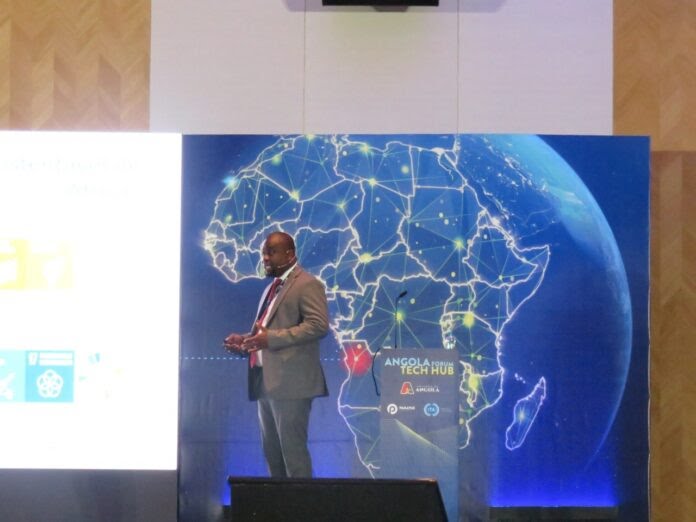On Tuesday, May 17, 2022, the Angolan Ministry of Telecommunications, Information Technologies and Social Communication (MINTTICS), in partnership wit
On Tuesday, May 17, 2022, the Angolan Ministry of Telecommunications, Information Technologies and Social Communication (MINTTICS), in partnership with Internet Technology Angola (ITA), organised the Angola Tech Hub Forum to commemorate the World Telecommunications and Information Society Day.
The forum themed “Angola’s Leadership for Digital Transformation in Africa” brought together 200 individuals from various social sectors and representatives from several industries, including hotels, finance, education and banking. The event aimed to bring together policymakers and government members to reflect on the potential and development of ICT, pointing out new business solutions within the scope of the diversification of the national economy.
The event also featured a keynote speech from the Angolan Minister of Telecommunications, Information Technologies and Social Communication and several panel discussions, including a presentation from Dr Zolana João, the Director-General of the Management Office of the National Space Program (GGPEN).
In his keynote address, the Minister of Telecommunications, Information Technologies and Social Communication, Engineer Manuel Homem, cited the ANGOSAT satellite communication network project and the Earth Observation Program as structuring.
According to the minister, such projects are “promoting the different agendas of digital transformation, positioning themselves as a driving force to accelerate Africa’s digital single market, improve the business environment and technological modernisation of public services, with digital inclusion as indispensable tools for co-observation and citizen participation in the decision-making process, as well as economic and social well-being”.
In addition, Engineer Manuel reiterated that the government would continue to invest in projects such as the creation of the television broadcasting industry and market within the framework of the digital communication strategy, the national broadband infrastructure [submarine and terrestrial fibre], the national satellite transmission structure of the ANGOSAT communication network project and the Earth observation programme, within the framework of the strategy of the Management Office of the National Space Program (GGPEN).
“We will continue to promote the sustainable development of public use telecommunications services and formulate guidelines that allow, in the medium and long term, to satisfy the basic needs of populations, companies and all other users throughout the national territory”, said Engineer Manuel Homem.
Speaking on the role of digital technologies in sustainable development, the Director-General of GGPEN, Dr Zolana João, commended the government’s dedication to advancing the continent’s digital transformation. He also discussed the role of space technologies and space derived data in Angola’s social, economic, political and environmental development. According to him, “Space technology is directly tied to the 17 United Nations Sustainable Development Goals and the 20 goals of the Agenda 2063, a strategic framework for the continent’s socio-economic transformation over the next 50 years.”
Dr João further explained that the two goals are interwoven and, as such, build on and seek to accelerate the implementation of past and existing continental initiatives for growth and sustainable development. He also spoke about the role of satellites, particularly regarding Angola’s border patrol management and digital inclusion plans. “Satellites play many roles roles in securing our border. Earth observation satellites provide detailed images of hot spots where border crossings peak”.
Also, Dr João explained that Africans invest more money off the continent to build digital technologies than it does on the continent, citing the continent’s annual USD 1 billion budget to rent foreign satellite capabilities. Dr João further notes that Africa invests about USD 400 billion to procure digital technologies and invests just a fraction of it [USD 5 billion] in manufacturing digital technologies locally.
He also spoke about the SADC Satellite Sharing Programme. “This regional initiative resulted from realising the satellite resource constraints (financial and technical) and the need to avoid duplication and promote complementarity in the SADC region”, said Dr João. The regional satellite sharing service comprises 16 states where all members pool their resources together to launch a communication satellite, thereby sharing the project’s financial risks and filling the telecommunication gaps through cross-jurisdictional collaboration. According to him, the satellite is scheduled for launch in 2027.
Dr João also spoke extensively about Angola’s second communication satellite, the Angosat–2. According to him, “Angosat-2 will also be a High Transmission Rate (HTS) satellite and will provide 13 Gps in each illuminated region (satellite signal range), covering the entire SADC region. ANGOSAT-2 will be seven times faster than its predecessor, ANGOSAT-1, with high transmission rates and intelligent transmission in smaller beams and over its coverage area region. With this, it is intended to minimise the problem of the digital divide, that is, to allow equal access to all Angolans [and the entire SADC region] to the benefits offered by Information and Communication Technologies (ICT).”
Finally, Dr João mentioned that as part of GGPEN’s mission to support sustainable development through space-based technologies, the agency had developed several new space-based solutions. “One of them is TECH-ECOLOGY, a solution that uses satellite radar images to detect, monitor and alert the occurrence of possible oil spills in the national offshore rigs”, concluded Dr João.
Fonte: Africanewspace.com

